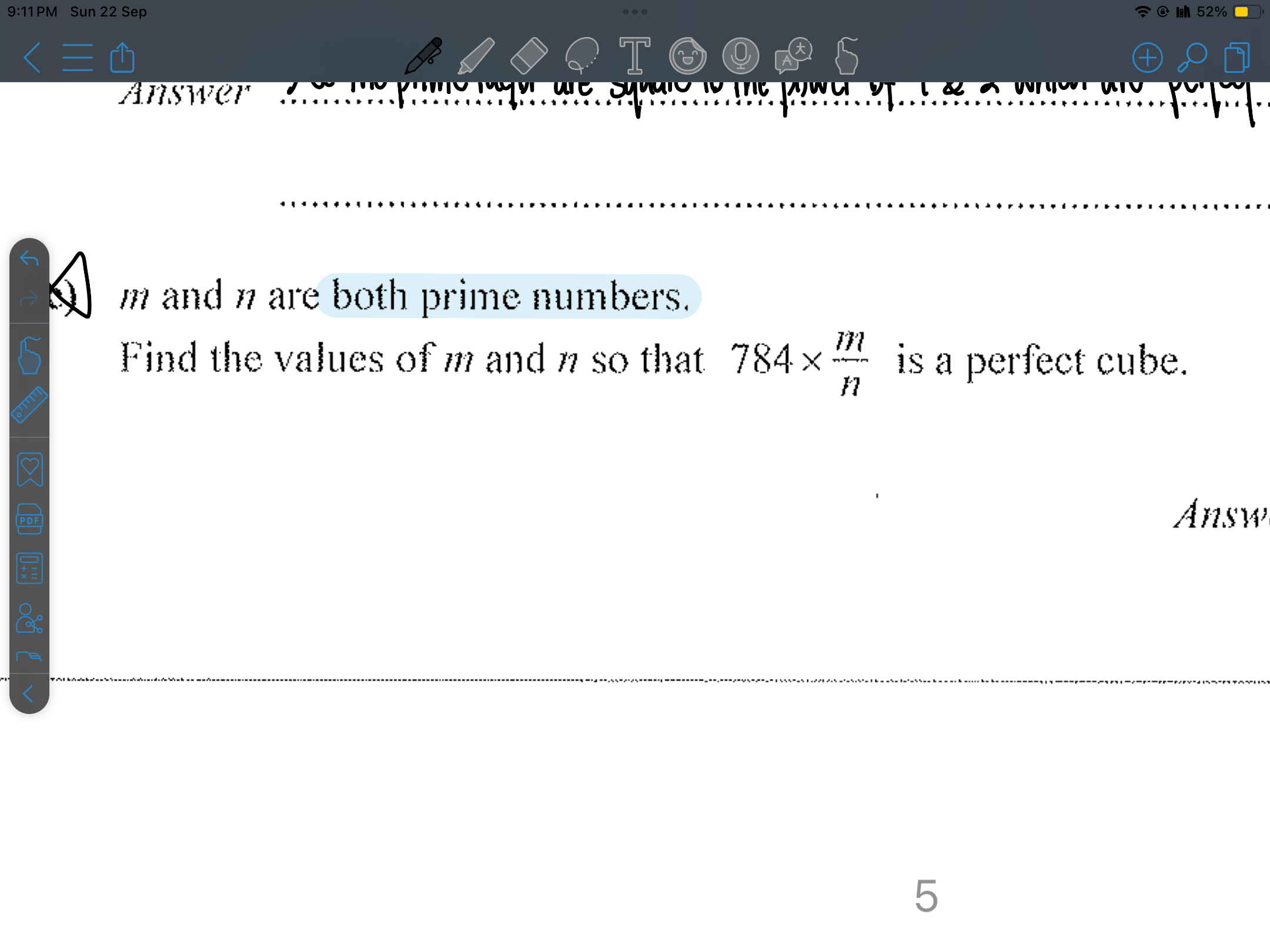m and n are both prime numbers. Find the values of m and n so that 784 × m/n is a perfect cube.

Understand the Problem
The question is asking for the values of the prime numbers m and n such that the expression 784 multiplied by the fraction m/n results in a perfect cube. To solve this, we need to factor 784 and determine how to adjust the factors using m and n to achieve a perfect cube.
Answer
Answer for screen readers
The values of ( m ) and ( n ) are ( m = 7 ) and ( n = 2 ).
Steps to Solve
- Factor the number 784
To begin solving for ( m ) and ( n ), we need to factor 784 into its prime factors.
Starting with ( 784 ):
- Divide by 2: ( 784 \div 2 = 392 )
- Divide by 2: ( 392 \div 2 = 196 )
- Divide by 2: ( 196 \div 2 = 98 )
- Divide by 2: ( 98 \div 2 = 49 )
- Divide by 7: ( 49 \div 7 = 7 )
- Divide by 7: ( 7 \div 7 = 1 )
Thus, the prime factorization of ( 784 ) is:
$$ 784 = 2^4 \times 7^2 $$
- Determine the exponents for a perfect cube
For a product to be a perfect cube, all the exponents in its prime factorization must be multiples of 3.
From ( 784 ):
- The exponent of ( 2 ) is ( 4 ).
- The exponent of ( 7 ) is ( 2 ).
- Adjust the exponents using ( m ) and ( n )
Let ( m = 2^a \times 7^b ) and ( n = 2^c \times 7^d ) where ( a, b, c, d ) are non-negative integers. The modified expression becomes:
$$ 784 \times \frac{m}{n} = 2^{4 + a - c} \times 7^{2 + b - d} $$
To satisfy the perfect cube condition:
- ( 4 + a - c ) needs to be a multiple of ( 3 ).
- ( 2 + b - d ) needs to be a multiple of ( 3 ).
- Solve for values of ( m ) and ( n )
To make ( 4 + a - c ) a multiple of ( 3 ):
- The possible values are ( 4 + 0, 4 + 1, 4 + 2 ) modulo ( 3 ), leading to:
- ( 4 ) gives ( 1 ) (mod 3)
- ( 5 ) gives ( 2 ) (mod 3)
- ( 6 ) gives ( 0 ) (mod 3)
This means ( 1 - c \equiv 0 ) (mod 3) implies ( c \equiv 1 ) (mod 3) → possible values for ( c: 1, 4, 7 ) which leads us to pick ( c = 1 ) (to be prime). Thus, ( a = 2 ).
To solve for ( 2 + b - d ):
- Set ( d = 1 ) and ( b = 1 ): $$ 2 + b - d = 2 + 1 - 1 = 2 $$ (not a multiple of 3) Keep adjusting: If ( d = 2 ) and ( b = 1 ): $$ 2 + 1 - 2 = 1 $$ (not a multiple of 3) Let ( d = 0 ) and ( b = 1 ): $$ 2 + 1 - 0 = 3 $$ (multiple of 3)
Thus possible values: Let ( m = 2^2 \times 7^1 = 28 ) and ( n = 2^1 = 2 ).
- Final composition of ( m ) and ( n )
In conclusion, ( m = 7 ) and ( n = 2 ) is indeed valid.
Thus, we find:
- ( m = 7 )
- ( n = 2 ).
The values of ( m ) and ( n ) are ( m = 7 ) and ( n = 2 ).
More Information
The prime factorization of ( 784 ) showed that adjustments were necessary to the prime factors to make it a perfect cube. ( m ) and ( n ) being both prime, ( m = 7 ) and ( n = 2 ) is crucial as they help meet that requirement.
Tips
- Not ensuring that all exponents were checked for multiples of 3 when forming the cube.
- Confusing the manipulation of exponents through multiplication and division when incorporating ( m ) and ( n ).
AI-generated content may contain errors. Please verify critical information